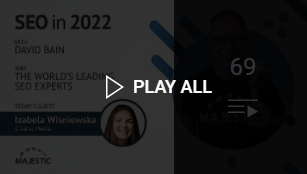-
Site Explorer
- Majestic
- Summary
- Ref Domains
- Backlinks
 New
New Lost
Lost- Context
- Anchor Text
- Pages
- Topics
- Link Graph
- Related Sites
- Advanced Tools
- Author ExplorerBeta
- Summary
- Similar Profiles
- Profile Backlinks
- Attributions
- Compare
-
Link Tools
- My Majestic
- Recent Activity
- Reports
- Campaigns
- Verified Domains
- OpenApps
- API Keys
- Keywords
- Keyword Generator
- Keyword Checker
- Search Explorer
- Link Tools
- Bulk Backlinks
- Neighbourhood Checker
- Submit URLs
- Experimental
- Index Merger
- Link Profile Fight
- Mutual Links
- Solo Links
- PDF Report
- Typo Domain
- Free SEO Tools
-
Support
- Blog

- Support
- Get started
- Tools
- Subscriptions & Billing
- FAQs
- Glossary
- How To Videos
- API Reference Guide

- Contact Us
- About Backlinks and SEO
- SEO in 2024
- Link Building Guides
- Webinars
- Blog
Use Agile for SEO testing
Luis says: "You can start implementing an Agile mentality for SEO into different areas, but my first focus would be around testing. It's now very important to define your own best practices. The length of your titles, amount of content on your page, and number of links are all very specific for your domain. The key to determining the best way to do things is quick testing. We've been developing what we call testing velocity, where we are rapidly testing different concepts and innovative approaches. This has given us the path to start creating our own set of best practices. Every domain is distinct, with different strengths, approaches, and structures. Consider what makes your domain unique, test fast, and continuously learn."
How often should you involve other people in the thought process of what you're doing?
"Agile is a process for managing a project involving constant collaboration and working in iterations. You need to collaborate all the time - from the inception of any SEO project. Since you're starting to create a strategy and implementation path, it's important you involve your engineering, science, and data teams from the beginning. This is something that needs to be integrated within the project itself - if and when you need to touch base shouldn't be a consideration. It's a constant learning process that needs to be fed by different teams with different expertise."
Are there other ways you are using Agile?
"Yes. More than just how to use it, technology is a key focus area for Agile. One of the biggest frustrations for CEOs is not having tools to play with, such as for your CMS, data, and dashboards. One of the best ways to integrate Agile mentality into the technology element is using every single data point and technology you have at hand - to implement your projects in the fastest way.
The second part would be to evolve as you need. Sometimes we want to have fancy tools with a specific UI that gives us everything in a dashboard quickly and easily. In reality, it would be better to use your resources as you actually need them. If you're facing a block, or trying to launch a test that involves new technology, that's when these steps need to be taken. Having a collaborative approach to building technology will be a key part of 2022. Developing your own tools internally would be a tremendous enabler - it has been for us."
Is what you're saying appropriate for small teams, or is there a certain team size required to take advantage of Agile working?
"No, this applies to any size of teams. In fact, the smaller the team, the more Agile mentality you should have. The fewer resources you have, the more balls you need to kick off at the same time. It's a matter of making sure your resources are being used constantly, regardless of the size of your team."
What are a few areas that SEOs can focus on initially to test the value of working in an Agile manner?
"Firstly, focus on your process: how are you taking care of all of your projects? How do you launch them? How do you bring this information to the table and start creating the plan to get there? Rigidness is not a value that I would implement a lot in SEO. The constant changes in the algorithm and people's behaviour are significantly altering how we use search. Quick iterations of your plan, having a very defined vision but with a restating path towards that vision, would be a good way to implement Agile into SEO."
Is it challenging to announce at a board level that your plans have changed? Do top-level executives look for more consistency in approach?
"They are looking for consistency towards the goal, and where you are actually going. They recognise that things change quickly, so there's a need to redefine the path that takes us there in the fastest, most efficient way. It's not been a challenge with leadership. It has worked well because we've properly defined our vision, have a strong foundation, and backed everything up with data. Change is always constant - particularly in SEO."
What are some quick wins an SEO could make by iterating quickly?
"Take a look at your titles. We all know they're important, and one of the top-ranking factors, but are you getting the true 100% value from your title? For example, sometimes length is not necessarily something that is very fixed, and you can have a longer length and actually have a higher performance. Play a lot with the format of your titles. Is it all caps? Is it with dashes? We've been finding that little format changes can make a significant difference. Agile and fast testing has allowed us to quickly see the results of changes and understand what is scalable. This is great because it doesn't require heavy SEO research, just observation of what is happening in the SERP."
What technology are you using to conduct these tests?
"On the process side, we are working heavily on Smartsheets, particularly in one area called Workspace. This tool allows you to connect different spreadsheets, systems, and web pages into a single UI - enabling you to change tabs within the same tab and use different tools.
On the implementation side, we use a lot of different spreadsheets that connect to the backend of our system. This is an example of evolving your technology as you need it. So far, using spreadsheets that we hand over to engineering, or upload to a CMS, has worked well without the necessity of having a specific UI. They help us to test more intuitively. We do all of this in-house and have been working closely with all of our technology partners. We are basically acquiring a lot of data from different services, allowing us to create our own dashboards and measurement for these tests."
How significant is this within your role, as a percentage? How often should an SEO be thinking about testing in an Agile way?
"At Uber, my focus was 100% on growth and testing, so this is every day and involves two parts. One is the inception and innovation part, such as creating ideas, making sure we're constantly feeding a pipeline of different experiments. The second part is how to evolve all the processing technology. Our tests are going to be as complex as our technology allows us to make them.
My advice to everyone would be to make this a significant amount of your time. Creating ideas, and exploring how you can maximise what you already have, should be a core part of everyone's week. Maximising what you already have, is going to be a profitable use of your time."
How do you measure success? Is it on click-through rate, time spent on that page, purchases, or some other metric?
"It's always a combination of metrics. Different experiments have different goals. For example, when you're already ranking in position number two or three, you're probably aiming for click-through rate improvements. We try to create a balance between the SEO metrics we have, such as sessions, rankings, and click rates, but also how these stats are contributing to the business. There's always a money component here, and leadership will understand revenue."
How do you persuade non-technical content teams that doing a test is the right thing to do?
"Definitely one of the biggest blockers is controlling how the brand is presenting itself, and the actual words used to do this. Firstly, you have to present this to them as a one-off, cautious test - it's not a full-blown rollout that you're doing for your entire site. This is always a very convincing factor.
The second part is that you are actually basing your research on data and benchmarks. If your competitors are able to drive further performance by using certain words, then you need to play on a level playing field. If you're not able to compete by using different types of words or different writing styles, you will never be successful with SEO.
I know the content teams are always very cautious about the tone they're using. And sometimes, the tone is not necessarily the best when you're adding in search phrases or long-tail keywords. Once you have showcased the value in that through testing, you're able to present the economic benefits your idea has. There's very little argument to advocate not bringing more money to the company - regardless of what the brand guidelines are."
What should an SEO stop doing to focus more time on Agile SEO testing?
"Sticking to your plan. I would really suggest that you don't stick to your plan. A lot of plans generally change according to the algorithm or the trends of the business. Don't marry your ideas. Always make sure you're listening more to the data and the results than what you have put onto paper. What is most important is that you achieve your goals - and the goal should never be executing a plan, or executing a specific project."
Luis Rodríguez is Global Growth SEO Lead at Booking.com.
Choose Your Own Learning Style
 Video
Video
If you like to get up-close with your favourite SEO experts, these one-to-one interviews might just be for you.
Watch all of our episodes, FREE, on our dedicated SEO in 2022 playlist.
 Podcast
Podcast
Maybe you are more of a listener than a watcher, or prefer to learn while you commute.
SEO in 2022 is available now via all the usual podcast platforms
Don't miss out
Opt-in to receive email updates.
It's the fastest way to find out more about SEO in 2025.
Could we improve this page for you? Please tell us






